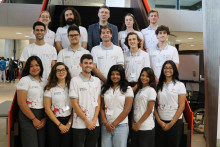Why this center?
Brey: `The department of philosophy has specialized itself more and more in the philosophy of technology in the past ten or fifteen years. The orientation used to be broader, but now almost ninety percent of our research is on technology and the relation between technology and society. We thought a separate profile of this research in a center was necessary. We operate strongly on an international basis and you're more visible as a center; it's easier to cooperate with other centers and it's easier to appeal to organizations like NWO.'
So it's a case of external profiling. And internally?
`Within the UT we want to bridge the gap between beta and gamma. That crossover between technological and social science research is also a task of the dean. We do that as a non-technical group by introducing our research to three technical research facilities, MESA+, BMTI and CTIT. We go to the technicians. From CEPTES there has been work done for the set up of a sixth center of excellence for ethics and technology in the 3TU-federation, which starts in 2007. That center will receive a more specific mission in the field of ethics. The ethical research of CEPTES will be combined with that center.'
What kind of research does CEPTES focus on?
`Our projects aim for the structure of technical sciences and the technical design process, the relationship between technology and society and ethical questions in technology development and usage. Examples? One recent project is about the relationship between natural sciences and technical sciences. The latter lacks a good philosophical image. We don't have anything but the fact that technical sciences are the application of the laws of nature. A much richer image about the form of these sciences is needed. A second project researches the way technical artifacts keep moral lessons: how is human behavior guided by technology? A car, for instance, that will only start when you have fastened the seatbelt. One of our newest projects treats the influence of contemporary media on the quality of society. Is the internet an addiction or liberation? Are mobile phones an improvement of communication or do owners suffer from the constant availability?'
What are the current trends in the philosophy of technology?
`Philosophy of technology finds more and more a connection to technical and social sciences; it's becoming less of an armchair philosophy. We look at recent developments. We don't just look in retrospect at the influence that some developments had, but we are parallel to the origin. An example is nanotechnology. Within MESA+ there is research going on about the social, ethical and philosophical aspects of nanotechnology. In the design trajectory the philosopher can participate.'
In the ideal situation, do designer and philosopher work together from the beginning?
`In the ideal situation the designer also knows something about philosophy and ethics. With big scale technological projects a philosopher should be involved from the beginning. In the case of biotechnology this was not done well; the social resistance is enormous. A bit more philosophical input would have been useful. With nanotechnology this is going a lot better, because people are thinking about the implications it could bring.'
Trans. H. van Dorp







